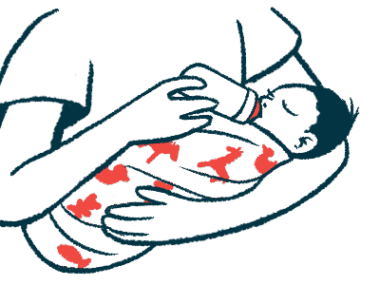When questioned about PNH, I had to learn how to answer
A disease fundraiser at a NASCAR event brings up curiosity about my diagnosis
Written by |

My husband, John “JB” Fortin, drives the #34 Modified for the NASCAR Whelen Modified Tour, the sport’s oldest division. I’m so grateful that he and his crew use their platform to bring more awareness to my disease, paroxysmal nocturnal hemoglobinuria (PNH).
During one of his 2019 races at Riverhead Raceway in New York, I was lucky that the track allowed me to hold a 50/50 raffle to raise funds for PNH research. While I was selling the tickets, a man asked me what exactly we were raising funds for. To keep it simple, we’d advertised the money was going to “blood disorder research,” which I told him. He was so friendly and genuine in asking more questions, but I became speechless trying to figure out how to explain it further.
PNH was still new to me; even though I was diagnosed with the disease about six months earlier, the complexity of it was still too overwhelming for me to understand. I was embarrassed that I didn’t know how to explain it beyond “it’s a rare blood disorder.” I was in sales mode at the event, trying to raise as much money as we could, and was taken aback by his genuine curiosity to know more.
I could tell he was confused when I had trouble answering his questions, so I laughed and promised that I wasn’t scamming him, that the money was indeed going toward the walk for the AAMDS International Foundation in New York City. He laughed, too, and kindly wished me well while we finished the ticket sale.
Breaking it down
That interaction made me realize how little knowledge I had about PNH and the science behind it. I started researching more to change that. My reasoning was equal parts wanting to know for myself and making it easier to explain to others.
I started by looking up videos on the correct pronunciation of the full name of the disease. According to Google, it is pronounced peh·ruhk·siz·muhl naak·tur·nuhl hee·muh·glow·buh·nur·ee·uh. (Try saying that five times fast.)
Then I began reading articles, medical papers, and any other material I could find on the internet to understand the mechanics behind PNH, but these sources were all so boring I had trouble getting through them. Having no medical background, the words were so foreign that I had to reread the same sentence five times before slightly understanding.
In my research, I stumbled upon a YouTube video that opened my eyes with a visual explanation of PNH. Having the cartoon images go through each step of what was going on inside my body helped me connect the big, fancy medical terms with simple concepts I could understand. A four-minute video gave me all the knowledge I was searching for.
Thereafter, I came up with a script I use to explain PNH to others. There are many ways to explain the disease and I’m by no means claiming mine is right, but I found this sentence to be a helpful start to the conversation: “PNH is a rare blood disorder where there was a mutation in my stem cells, causing certain cells to be missing a protein. My body views those cells to be pathogens, so it attacks and kills them.”
Most of the time this statement leads the conversations that follow people’s questions, like those when the man was buying our raffle tickets. It may feel frustrating or maybe even violating to go into detail about your medical history, but I found that when people ask questions, it’s because they care. They most likely aren’t trying to pry in your personal business; they’re concerned and want to feel more connected to you and your experience.
If you find yourself with questions to answer, just remember that you can give as much or as little information as feels comfortable in explaining your PNH journey. You choose how you tell your story, but giving a basic understanding of PNH is a great place to start.
Note: PNH News is strictly a news and information website about the disease. It does not provide medical advice, diagnosis, or treatment. This content is not intended to be a substitute for professional medical advice, diagnosis, or treatment. Always seek the advice of your physician or other qualified health provider with any questions you may have regarding a medical condition. Never disregard professional medical advice or delay in seeking it because of something you have read on this website. The opinions expressed in this column are not those of PNH News or its parent company, Bionews, and are intended to spark discussion about issues pertaining to paroxysmal nocturnal hemoglobinuria.






